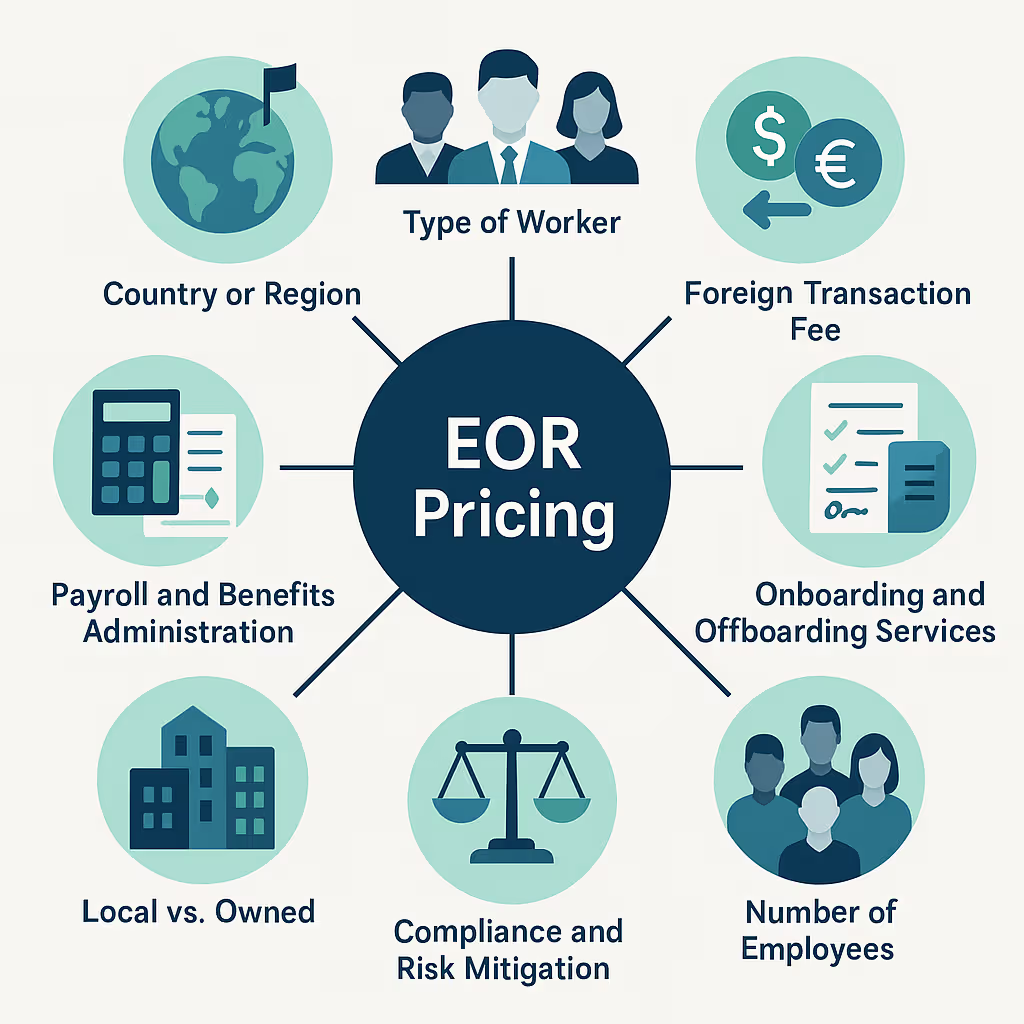Key Takeaways
- Employer of Record costs typically range from $300 to $1,000 per month per employee or 8% to 20% of salary, depending on the country, role complexity, and pricing model.
- EOR pricing varies significantly by region, with Western Europe and North America commanding higher fees due to complex labor laws, while Latin America and Southeast Asia offer more affordable options.
- Hidden fees like setup charges, currency conversion markups, and termination costs can substantially increase your total Employer of Record pricing if not identified upfront.
- Transparent EOR providers disclose all fees including onboarding, FX rates, and offboarding costs, helping you budget accurately and avoid surprise charges as you scale globally.
While EORs make global hiring simpler by handling payroll, benefits, and compliance across borders, their pricing models can be confusing at first glance. Some charge flat monthly fees, others take a percentage of salaries, and many have additional costs that aren't immediately obvious.
In 2026, 58% of companies are hiring internationally, yet pricing confusion remains the biggest challenge when evaluating EOR providers. In this guide, you'll get a complete breakdown of what drives EOR costs, the different pricing models available, regional cost ranges, hidden fees to watch out for, and when using an EOR makes the most financial sense compared to alternatives like setting up a local entity or hiring contractors.
What Factors Affect Employer of Record Pricing?

Several key elements influence how much you'll pay for EOR services. Let's look at each one:
Country or Region of Hire
Location is perhaps the biggest factor affecting your EOR costs. Each country has its own:
- Labor laws and compliance requirements
- Tax systems and filing procedures
- Mandatory benefits and social contributions
- Administrative complexity
For example, hiring in France typically costs more than in the Philippines because French employment law requires extensive benefits and has strict termination rules. Similarly, Brazil's complex tax system makes EOR services there more expensive than in many other Latin American countries.
Type of Worker and Role
The nature of the position you're filling affects pricing in several ways:
- Full-time vs. part-time: Most EORs charge less for part-time workers, though not proportionally to hours worked
- Salary level: With percentage-based models, higher salaries mean higher fees
- Executive positions: Senior roles often require additional compliance considerations and benefits
- Specialized roles: Positions with unique regulatory requirements (like financial services) may cost more
A software developer earning $120,000 in Germany will generally cost more in EOR fees than a customer service representative making $35,000 in Mexico.
Payroll and Benefits Administration
The complexity of payroll processing varies by country and affects your Employer of Record cost:
- Monthly vs. bi-weekly pay periods
- Local tax calculations and filings
- Mandatory benefits administration
- Bonus and commission processing
- Expense reimbursement handling
- Leave management
Countries with 13th-month pay requirements (like Italy and the Philippines) or complex social security systems add to the administrative burden and, consequently, to your EOR costs.
Foreign Transaction (FX) Fee
When paying employees in local currencies, most EORs charge:
- Currency conversion fees (typically 1-3%)
- International wire transfer costs
- Banking fees for local disbursements
These fees can add up, especially when hiring across multiple countries with volatile currencies.
Onboarding and Offboarding Services
The process of bringing employees on board and eventually terminating them includes:
- Contract generation and localization
- Background checks and verification
- Equipment provisioning coordination
- Termination notice management
- Severance calculation and payment
- Exit documentation
Some EORs include these services in their base fee, while others charge separately for each step.
Compliance and Risk Mitigation
Legal protection is a core value of EOR services, but the level of coverage varies:
- IP protection measures
- Data privacy compliance (GDPR, etc.)
- Work permit and visa assistance
- Audit support and documentation
- Legal consultation access
Premium EORs often charge more but provide stronger compliance guarantees and risk management.
Local vs. Owned
Some EORs own legal entities in the countries where they operate. Others rely on third-party partners or resellers. Owned entities generally mean faster service, better compliance, and more control, but they can also mean higher pricing because the EOR has invested in local infrastructure.
Partner-based models might offer lower upfront costs, but you sacrifice some transparency and may encounter delays or inconsistent service quality. When comparing providers, ask whether they operate through owned entities or partners in your target markets.
Number of Employees
Hiring one employee in one country will cost more per head than hiring 20 employees across multiple regions. Many EORs offer discounts for larger teams or long-term contracts, especially if you're committing to a certain headcount.
If you're scaling quickly, negotiate pricing tiers that reflect your growth trajectory. Conversely, if you're testing the waters with a single hire, expect to pay a premium until you expand.
Employer of Record Pricing Models Explained
EOR providers use different pricing structures, each with trade-offs:
Percentage-Based Model
Many EORs charge a percentage of each employee's monthly salary, typically ranging from 8% to 20%.
How it works:
- Employee salary: $5,000/month
- EOR fee at 15%: $750/month
- Total monthly cost: $5,750 (plus benefits and taxes)
Advantages:
- Scales naturally with salary levels
- Often includes more services in the base fee
- Can be cost-effective for lower-salaried positions
Disadvantages:
- Becomes expensive for high-salary employees
- Less predictable for budgeting as salaries change
- May include hidden calculation methods (percentage of total cost of employment vs. base salary)
Flat-Fee Model
Some EORs charge a fixed monthly amount per employee, regardless of salary.
How it works:
- Fixed fee: $499 per employee per month
- Same cost whether the employee makes $3,000 or $10,000
- Additional services may be charged separately
Advantages:
- Predictable costs for budgeting
- Often more economical for high-salary positions
- Easier to understand and calculate
Disadvantages:
- Can be expensive for lower-paid employees
- May not include all necessary services
- Often varies by country despite being "flat"
Tiered or Custom Pricing
Larger EORs frequently offer volume-based discounts or custom packages.
How it works:
- 1-5 employees: $599 per employee
- 6-20 employees: $549 per employee
- 21+ employees: $499 per employee
Advantages:
- Rewards scaling with better rates
- Can be tailored to specific business needs
- Often includes more comprehensive service packages
Disadvantages:
- May require long-term commitments
- Less transparent pricing upfront
- Can include minimum spend requirements
Average Cost Ranges for EOR Services (By Region)
EOR pricing varies significantly by region due to differences in compliance complexity, labor costs, and market competition. In 2026, major employment law reforms are underway in the UK, Belgium, Italy, India, Japan, and several Latin American countries, which may affect regional compliance costs and EOR pricing throughout the year.
Remember that these ranges are approximate. The actual Employer of Record cost depends on the specific country, the employee's position, and the services included.
For example, Switzerland and Singapore typically have the highest EOR costs within their regions due to their complex regulatory environments and high local salaries.
Hidden Fees to Watch Out For
Beyond the base pricing model, many EORs charge additional fees that can significantly increase your total cost:
Setup or Onboarding Fees
One-time charges to establish service:
- Entity setup fees: $500-$2,000 per country
- Employee onboarding: $100-$300 per employee
- Implementation fees: $1,000-$5,000 for platform integration
These fees are often negotiable, especially for multiple hires.
Currency Conversion and Payment Processing Fees
Financial transaction costs include:
- FX markup: 1-3% above market rates
- Wire transfer fees: $25-$50 per transfer
- Payment processing: 0.5-1.5% of payroll amount
These fees can add up quickly when paying employees across multiple countries.
Termination Costs
Ending employment relationships comes with its own expenses:
- Termination processing: $200-$500 per employee
- Severance calculation and distribution: Often a percentage of the payout
- Notice period management: Additional monthly fees during notice periods
Countries with strong worker protections (like France, Italy, and Brazil) have particularly high termination costs.
Custom Service Add-Ons
Additional services that may carry extra charges:
- Visa and immigration support: $1,000-$3,000 per case
- Equipment procurement and shipping: Cost plus 10-20% handling fee
- Background checks: $50-$200 per employee
- Legal consultation: $250-$500 per hour
- Benefits administration beyond statutory requirements: 3-7% of benefits cost
Always ask for a complete list of potential add-on fees before signing a contract.
EOR vs Local Entity vs Contractors: Cost & Risk Snapshot
To understand if an EOR is worth the cost, compare it to your alternatives:
The EOR model typically becomes more cost-effective than establishing a legal entity when you have fewer than 10-15 employees in a country. Above that threshold, the economics often favor creating your own entity.
When EOR is The Right Choice
An Employer of Record (EOR) is particularly advantageous in the following scenarios:
- You're expanding into a new country for the first time and don't want to commit to a full legal entity before testing demand or talent availability.
- You need to hire quickly, within days or weeks, not months. Setting up a local entity takes time: an EOR gets you operational fast.
- You're hiring a small team (1–10 people) in a region. The math rarely justifies entity setup at this scale.
- Compliance and risk scare you (and they should). If you're not confident navigating foreign labor laws, tax codes, and employment regulations, an EOR takes that burden off your plate.
- You want flexibility. Maybe this hire is temporary, or you're unsure if this market will work out. An EOR gives you an exit strategy without the baggage of winding down a legal entity.
- Your team is fully remote and distributed. Hiring across 5+ countries makes entity setup impractical: an EOR scales with you.
- You lack in-house global HR and legal expertise. If you don't have dedicated resources to manage international employment, outsourcing to an EOR makes financial and operational sense.
The cost premium associated with using an EOR is often justified by the substantial time savings, risk mitigation, and increased operational flexibility it provides.
Borderless AI: Transparent Pricing for Global Teams
At Borderless AI, we've built our pricing model around transparency and predictability. Our AI-powered platform eliminates many of the manual processes that drive up traditional EOR costs.
Our pricing includes:
- Flat monthly fee per employee (varies by country)
- No percentage-based markups on salaries
- No hidden FX fees – we use real-time exchange rates
- We don't hold salary deposits - funds go straight to your team
- Fastest payroll processing speeds in the industry
- Onboarding/offboarding fees may apply in certain jurisdictions
- We own our local entities - no third-party intermediaries
Our AI-powered platform reduces costs by automating:
- Contract generation in 170+ countries, 90+ currencies
- Compliance monitoring and updates
- Payroll calculations and processing
- Benefits administration
To get an exact quote for your specific hiring needs, try our Employee Cost Calculator which provides a detailed breakdown of all costs involved in hiring internationally.
Final Thoughts: Getting the Best Value from EOR Services
Finding the right EOR at the right price requires looking beyond the sticker price:
- Compare total cost of ownership, not just the base fee
- Ask about all potential fees upfront, including setup, FX, and termination costs
- Consider service quality and support availability—cheaper isn't better if compliance issues arise
- Evaluate technology platforms that can integrate with your existing systems
- Look for scalability in pricing as your team grows
- Request references from companies similar to yours
The best value comes from an EOR that balances cost with quality service, strong compliance, and technology that makes global employment easier.
FAQs
What is the average EOR fee?
The average EOR fee ranges from $300-$1,000 per employee per month or 8-20% of salary, varying by country, provider, and services included.
Why do EOR costs vary so much?
Pricing differences in EOR reflect variations in local compliance complexity, provider expertise, technology investment, support quality, and included services.
Can I negotiate EOR pricing?
Yes, you can negotiate EOR pricing, especially if you're hiring multiple employees or entering into a long-term agreement. Volume discounts of 10-20% are common for teams of 10+ employees.
What is the difference between flat-fee and percentage-based EOR pricing?
Flat-fee pricing charges a fixed monthly amount per employee regardless of salary, offering predictable budgeting. Percentage-based pricing charges a percentage of gross salary, scaling proportionally but becoming expensive for high earners. Both models have trade-offs depending on your team composition.
Are there hidden fees when using an Employer of Record?
Yes, common hidden fees include onboarding charges ($200–$1,000 per employee), foreign exchange conversion fees (1%–3%), offboarding or termination costs ($100–$500+), and custom service add-ons like visa sponsorship or stock option administration. Always request a detailed cost breakdown.
When is it more cost-effective to use an EOR instead of setting up a local entity?
An EOR is more cost-effective when hiring 1–10 employees in a new country, testing markets, or needing quick deployment. Setting up a local entity costs $10,000–$100,000+ upfront and requires long-term commitment, making it practical only for larger, permanent teams.
Which countries have the highest Employer of Record costs?
Western Europe (UK, Germany, France) and North America (US, Canada) typically have the highest EOR costs, ranging from $500–$1,000 monthly or 10%–18% of salary, due to complex labor laws, high social contributions, and stringent compliance requirements.
Can an Employer of Record help avoid worker misclassification penalties?
Yes, an EOR assumes legal employer responsibilities and ensures proper worker classification, protecting you from misclassification penalties that can result in fines, back taxes, and legal disputes. This is especially valuable when the line between contractor and employee is unclear.





.png)
.png)


